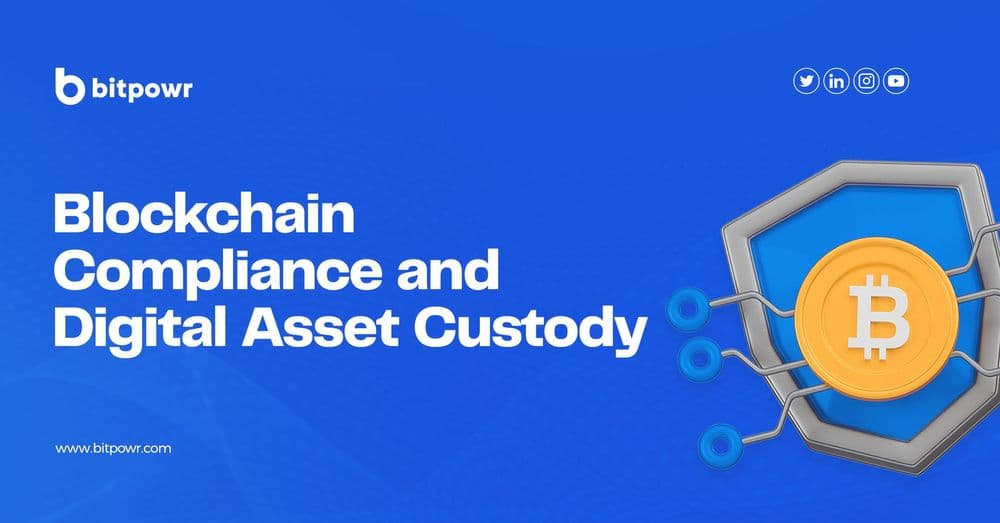What Is Digital Asset Custody?
Digital asset custody refers to the safekeeping and protection of digital assets, such as cryptocurrencies, tokens, and other digital securities, on behalf of their owners. It involves storing and managing the private keys that prove ownership of these assets, ensuring that they are secure and protected from loss, theft, or misuse.
Challenges of Achieving Blockchain Compliance and Secure Digital Asset Custody.
-
Jurisdictional Variations: Blockchain operates globally, and different jurisdictions have varying regulations and legal frameworks for cryptocurrencies, token offerings, smart contracts, and other blockchain-related activities. Understanding and complying with the specific requirements of each jurisdiction where you operate or have customers is crucial.
-
Know Your Customer (KYC) and Anti-Money Laundering (AML): Many jurisdictions require blockchain-based businesses to implement KYC and AML measures to prevent money laundering and terrorist financing. Implementing robust identification and verification procedures and ensuring compliance with KYC/AML regulations is essential.
-
Securities Regulations: Blockchain-based token offerings, such as ICOs or security token offerings (STOs), may be subject to securities regulations in various jurisdictions. Determining whether a token qualifies as a security and complying with the applicable regulations, including registration, disclosure, and investor protection requirements, is critical.
-
Data Privacy and Protection: Blockchain technology inherently stores data in an immutable and decentralized manner, raising concerns about data privacy and protection. Compliance with data privacy regulations, such as the GDPR in the European Union, becomes important when personal data is involved.
-
Consumer Protection: Blockchain-based products and services should adhere to consumer protection laws and regulations. Ensuring transparency, accurate disclosure of information, and fair treatment of customers is crucial to maintain consumer trust and compliance with applicable consumer protection laws.
-
Intellectual Property Rights: Blockchain’s transparent and decentralized nature poses challenges for intellectual property (IP) rights protection. Navigating IP issues, such as copyright, patents, and trademarks, within blockchain ecosystems requires careful consideration of jurisdictional laws and the potential impact on ownership, licensing, and infringement disputes.
-
Cross-Border Transactions and Remittances: Blockchain facilitates cross-border transactions and remittances, but regulatory requirements and restrictions on financial transfers vary between jurisdictions. Complying with international payment regulations, foreign exchange controls, and cross-border money transfer laws is essential to operate legally and avoid penalties.
-
Smart Contracts and Legal Validity: Smart contracts, which are self-executing agreements on the blockchain, raise questions about their legal enforceability and validity in traditional legal systems. Understanding the legal implications of smart contracts and ensuring compliance with contract laws and regulations in various jurisdictions is crucial.
-
Regulatory Sandboxes and Innovation Hubs: Some jurisdictions have established regulatory sandboxes or innovation hubs to foster blockchain innovation while providing a controlled environment for testing and development. Engaging with these initiatives can help navigate regulatory challenges and gain regulatory insights.
-
Evolving Regulatory Landscape: The regulatory landscape for blockchain is rapidly evolving, with new laws and regulations being introduced or amended regularly. Staying up-to-date with regulatory developments, engaging with industry associations, and consulting legal experts with blockchain expertise are crucial to ensure compliance.
How is Bitpowr Addressing these Challenges?
Bitpowr tackles these challenges with its wallet infrastructure , employing advanced security protocols and regulatory compliance measures. Key features include:
- Multi-Party Computation (MPC): Ensures secure storage and management of digital assets through the use of MPC technology.
- Hardware Security Module (Cloud HSM): Provides an additional layer of security by storing and managing cryptographic keys in a secure environment.
- Unified Future-Proof Platform: Ensures compliance with evolving regulatory requirements and technological advancements.
- Extensive Multi-Chain Support: Supports multiple blockchain protocols, allowing users to manage and interact with digital assets across different blockchains.
- Compliance Infrastructure: Integrates leading AML/KYC solutions to ensure compliance with regulatory requirements.
- Secure Policy Engine: Allows users to configure custom transaction policies, ensuring that transactions are carried out following their specific requirements.
- Data Encryption and Access Controls: Protects user data using physical, technical, and administrative security measures, including data encryption and access controls.
- Regular Security Audits and Updates: Regularly performs security audits and updates its infrastructure to ensure it remains secure and compliant with the latest regulatory requirements.
By leveraging Bitpowr’s comprehensive wallet management platform, you can ensure the security and integrity of your digital assets while complying with regulatory requirements.




